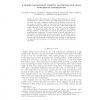Free Online Productivity Tools
i2Speak
i2Symbol
i2OCR
iTex2Img
iWeb2Print
iWeb2Shot
i2Type
iPdf2Split
iPdf2Merge
i2Bopomofo
i2Arabic
i2Style
i2Image
i2PDF
iLatex2Rtf
Sci2ools
113
click to vote
OL
2010
2010
A biased random-key genetic algorithm for road congestion minimization
One of the main goals in transportation planning is to achieve solutions for two classical problems, the traffic assignment and toll pricing problems. The traffic assignment problem aims to minimize total travel delay among all travelers. Based on data derived from the first problem, the toll pricing problem determines the set of tolls and corresponding tariffs that would collectively benefit all travelers and would lead to a user equilibrium solution. Obtaining high-quality solutions for this framework is a challenge for large networks. In this paper, we propose an approach to solve the two problems jointly, making use of a biased random-key genetic algorithm for the optimization of transportation network performance by strategically allocating tolls on some of the links of the road network. Since a transportation network may have thousands of intersections and hundreds of road segments, our algorithm takes advantage of mechanisms for speeding up shortest-path algorithms.
| Added | 29 Jan 2011 |
| Updated | 29 Jan 2011 |
| Type | Journal |
| Year | 2010 |
| Where | OL |
| Authors | Luciana S. Buriol, Michael J. Hirsch, Panos M. Pardalos, Tania Querido, Mauricio G. C. Resende, Marcus Ritt |
Comments (0)

